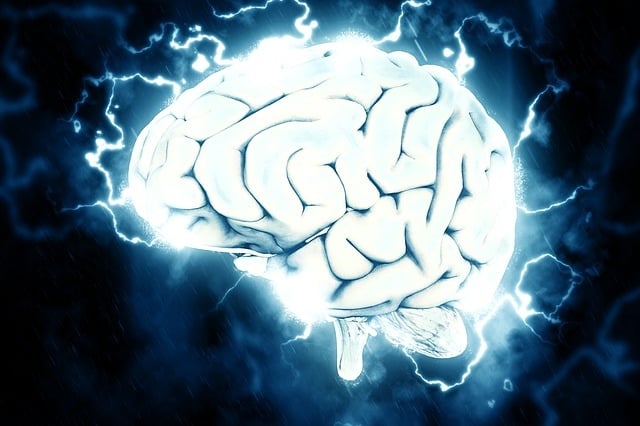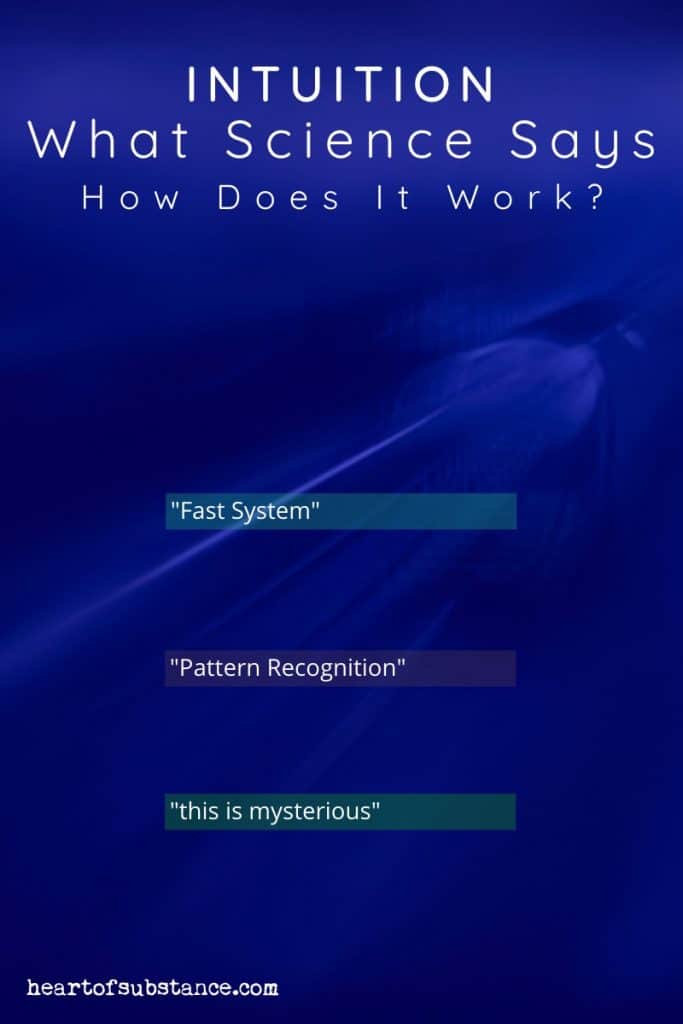Today, intuition is a legitimate subject of scientific inquiry. There’s no denying intuition exists. Countless well-known people acknowledge it and there are intuitive people who show signs and ‘live’ it. In this article, I pay attention to science and intuition, that is, what the research tells us about intuition.

As far as science goes, is intuition real? Does intuition exist? Are there any scientific studies that can explain intuition?
Some might even query: is science intuition or logic-based? Well both, really, as is explained further down.
Once thought of as esoteric and ‘New Age’ and consigned to parapsychology, telepathy, and premonition, intuition is now a popular topic in psychology. 4
In terms of psychology, what does intuition mean?
Intuition definition psychology wise: “the productive influence of non-conscious emotional information on an otherwise unrelated decision or judgement” per one group of researchers in the absence of a concise scientific definition. 1
Another definition, in the field of social cognition: “The ability to implicitly learn and detect cognitive patterns, and to subconsciously combine information in complex ways to make correct judgments based on fragmentary cues“.5
To a person in the street, intuition is a ‘gut feeling‘, an ‘inner voice’ or a ‘sixth sense’.
Interested in intuition? Check out this beginner’s guide.
Intuition is “a brain process that gives people the ability to make decisions without the use of analytical reasoning”, according to Live Science May 20, 2016.
Science and Intuition: Can Science Explain Intuition?
Scientific research on intuition is limited. But can intuition be measured?
Measuring Intuition
In 2016, one study claimed to have measured intuition1. The experiment involved participants treated with an exposure of emotion-provoking images of which they were unaware but with which they appeared to use to make fast and accurate decisions. Their responses also improved with time, indicating an avenue existing to develop intuition.
Illusions are the microscopes for the mind.
Joel Pearson, psychologist and neuroscientist
What is the scientific explanation of intuition?
One study informing on the scientific explanation of intuition is this 2018 “The Structure of Intuitive Abilities and Their Relationships with Intelligence and Openness to Experience” published in the journal, Intelligence (Vol 67 p1-10). 5
According to the authors “intuition is not a unitary psychological construct but rather a complex cognitive conglomerate that incorporates diverse processes and mechanisms and these intuitive abilities are largely independent from psychometric intelligence”.
Hmm… that’s a huge statement. Let’s break it down. Basically it means intuition is a complex mix of awareness. That it consists of a number of different and distinct parts, each incorporating diverse processes and mechanisms. Plus, it does not comprise one physiological form and is largely distinct from what is normally measured as intelligence.
It simply means intuition is not a simple process, nor is it simple to explain. (Yet for those that live intuitively, it simply happens.) Also, intuition doesn’t conform to rules that measure ‘intelligence. Just like, I didn’t conform to rules on grammar above in using repetitive words, simple/simply.
Back to the study…The authors confirmed the existence of three types of intuitive abilities. Let’s look at those.
Three Types of Intuitive Abilities
Based on the 2018 work of Sobkow et al.5…
1. ‘I know something. however, I do not know the source of this knowledge’
This is Coherence and Insight: IQ strongly correlates with this type of intuition. According to the study, this was “associated with an ability to subconsciously combine information stored in long-term memory to make correct judgments based on fragmentary cues”5.
2. ‘I do not know that I know something’ 5
Implicit Learning is the intuition type where someone can “spontaneously learn and detect cognitive patterns”5.
More on pattern thinking later.
3. ‘I think that I know something’ 5
Subjective Intuitive Abilities: This category relates to the people who like to daydream and “have highly vivid and creative mental imagery, are open to new experiences (e.g. seeking new places and eating unusual food), and are intellectually curious (e.g. enjoy puzzles and philosophical debates)” and show a preference for intuition5. Show of hands…Is this you?
What Part of The Brain Is Responsible for Intuition
Where does intuition come from?
We are getting close to knowing, according to a Big Think article in 2018: “Scientists are zeroing in on where intuition comes from, biologically“.
Wow, that seems interesting. But then, a headline is about catching readers’ interest. The article infers the gut as the source of intuition based on Higginson et al 3, who found a mind-gut link in how animals ‘trusted their gut’ when it came to hunger and a single behavior, foraging. Notably, Higginson et al were comparing learning in animals to Bayesian learning (the research was not about intuition).
You also have to ask: is the mind-gut link about instinct, or intuition? There are differences, and oft these two are talked about as the same, even by well-known sources. Does this mind-gut connection explain the experiences of highly intuitive folk? Or, is this mind-gut thing more about our primal instincts? Or both…instinct and intuition working in unison?
Much more research is needed to unravel this quest to understand intuition. It would seem that the above headline takes a huge leap, far from actual research findings, to infer ‘zeroing in’ on human intuition.
In another study, research data shows intuition and pattern-recognition as emanating from one of two brain systems used to arrive at answers to problems, the second brain system being analytical2. Let’s look at this.
Pattern Recognition in Making Decisions
Your brain, whether it’s your primary or secondary (gut) brain, stores insights from all past experiences. Try thinking of this as being your library of data.
Your mind is wired to recognize patterns in this data. This information source has been developing and expanding since you were born taking in every interaction, positive or negative, and cataloging it.
Intuition is considered the fast system of thinking (System 1) that draws from that catalog in your brain to inform your decisions2. This compares to the analytical style of thinking (System 2) that is slow and follows rules to derive your answer.
Strategic Intuition
Using intuition for generating ideas in business to provide real success is a strategic way of looking at intuition and one gaining recognition in management circles.
A scientific study, lead by Professor John Mihalasky of Newark Institute of Technology, over 10 years in the 1960s-70s, tested 385 CEOs of American corporations on their intuitive abilities. It showed 81% of CEOs who scored high on the intuition scale had doubled their business within five years. This compared to only 25% of those with low intuition scores doing the same. Because of its importance, governments and corporations are making huge investments in developing ways to understand intuition and its role in strategic endeavors.
What Role Does Intuition Play in Philosophy and Science?
Albert Einstein considered imagination greater than knowledge.
How important is intuition and imagination for a scientist?
Here’s the deal…Scientists use intuition and imagination for ideas and to develop a theory of which they then can test by gathering and analyzing data. Intuition has a role again as a ‘gut check’ of the results.
An example: According to a founder of Gestalt Psychology, Max Wertheimer, Einstein’s intuition led him to the idea that the common presuppositions in physics might be wrong. 6 Of course, we all know of Einstein’s famous discoveries that eventuated to set new paradigms in physics.
What is the Difference Between Scientific Intuition and Religious Faith?
There are striking similarities between people who follow their intuition and those who have religious faith, though few people support both and I won’t go into this here. Understanding the difference between the scientific view of intuition and religious faith, however, is something else.
There are 4200, or thereabouts, religions in the world, but here’s my take…
Religious faith is a belief that a higher source of power (God) will ‘take care of things’ and provide you with what you pray for and seek. (Ask and you shall receive. Sound familiar? To me it’s similar to living intuitively.)
One main scientific view of intuition is that you internally process, e.g. using Brain System 1 and pattern-recognition, to quickly and intuitively decide the way forward for what you seek. Though, now with subjective intuition accepted as one of three types of intuition, 5 there seems more to unravel.
The majority of researchers agree that intuition predominantly operates implicitly, without cognitive control and awareness.
Sobkow and others, 2018, Intelligence, Vol 67, pp 1-10.
Perhaps you have a different view. Feel free to comment below.
Suggested Reading
Understanding Intuition: A Journey In and Out of Science, by Lois Isenman, Elsevier. Available at Amazon — See details! (affiliate link)
Info Sources
Live Science on Intuition |
- Lufityanto, G., Donkin, C., & Pearson, J. (2016). Measuring Intuition: Nonconscious Emotional Information Boosts Decision Accuracy and Confidence. Psychological Science. doi: 10.1177/0956797616629403
- Tay, S. W., Ryan, P., & Ryan, C. A. (2016). Systems 1 and 2 thinking processes and cognitive reflection testing in medical students. Canadian medical education journal, 7(2), e97-e103. See here.
- Higginson, Andrew D., Fawcett, Tim W., Houston, Alasdair I., McNamara, John M. 2018. Trust your gut: using physiological states as a source of information is almost as effective as optimal Bayesian learning. J Proceedings of the Royal Society B: Biological Sciences. doi:10.1098/rspb.2017.2411. See here.
- Hodgkinson, G. P., Langan-Fox, J., & Sadler-Smith, E. (2008). Intuition: A fundamental bridging construct in the behavioural sciences. British Journal of Psychology, 99(1), 1–27. https://dx.doi.org/10.1348/000712607X216666. See here.
- Sobkow, A., Traczyk, J., Kaufman, S. B., Nosal, C. 2018. The structure of intuitive abilities and their relationships with intelligence and Openness to Experience, Intelligence, 67, 1-10, ISSN 0160-2896, https://doi.org/10.1016/j.intell.2017.12.001. See here.
- Kounios, J., & Beeman, M. (2014). The cognitive neuroscience of insight. Annual Review of Psychology, 65, 71–93. https://dx.doi.org/10.1146/annurev-psych-010213-115154.
- Öllinger, M., & von Müller, A. (2017). Search and Coherence-Building in Intuition and Insight Problem Solving. Frontiers in psychology, 8, 827. doi:10.3389/fpsyg.2017.00827
- Brain Image by TheDigitalArtist on Pixabay





